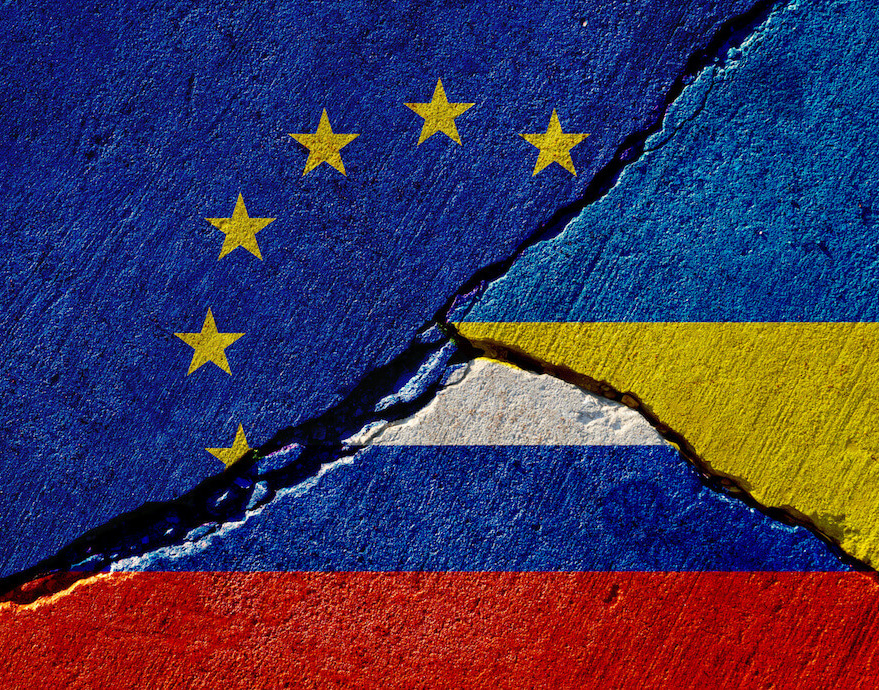This website uses cookies so that we can provide you with the best user experience possible. Cookie information is stored in your browser and performs functions such as recognising you when you return to our website and helping our team to understand which sections of the website you find most interesting and useful.

In a volatile world, take a breath
February 25, 2022 by
The volatile nature of the world, however shocking, isn’t a surprise to the markets
To say that the world has faced a few upsets in recent months is somewhat of an understatement. Add to that the current escalation of tension in Eastern Europe and the oncoming economic uncertainty that that will cause and you may be forgiven for questioning your current investment strategy.
However, it is crucial that you remember that geopolitical events like military and economic conflicts very quickly get factored into market performance and as a result get ironed out in the long-term. Especially if you have a wide portfolio spread across different sectors and risk profiles.
We can’t predict the future, but we can look back at the past
Generally speaking, history shows us that markets march forward. Yes there are fluctuations at the point of crisis, but they do dissipate. Historical performance has always proven that the markets are stronger than the outside effects that we all fear will impact upon them.
Whilst looking back is no guarantee of future performance, it does inform us as to what happens when investors panic and jump around at times of uncertainty. That kind of knee-jerk reaction never ends well.
History shows us that the markets just don’t panic
The recent invasion of Ukraine and the outrage felt by the West has resulted in a raft of sanctions aimed at ‘hobbling’ the Russian economy that will no doubt be felt in some way by us all. However the markets are robust machines and they are relentless. In fact these current sanctions are nothing new and are simply being added on top of previously existing trade restrictions that the markets have known about for decades.
Other examples of geopolitical events that you may have thought would upset the markets can be seen when, in 2020 and 2021, the USA issued an order forbidding any US citizen from investing in certain Chinese companies.
In more extreme cases, geopolitical events have caused markets to actually cease trading. Back on 27 June 2015, Greece ceased trading on its stock market following the default on its Government debt. With the Athens exchange staying closed until 3 August that year. During the 2011 Arab Spring, the Egyptian Stock Exchange closed on 27 January and stayed shut for over a month.
Ceasing trading isn’t just the prerogative of the emerging markets. There are scores of examples of mainstream market disruption, including The Tokyo Stock Exchange closing for 10 days in 2019 just after Japanese Emperor Akihito abdicated the Chrysanthemum Throne. Even the New York Stock Exchange closed until September 17 following the appalling attacks on the World Trade Center.
These out of the ordinary events are nothing new, and although the events may vary, these kinds of geopolitical impacts have happened before and will continue to happen in the future. However, history shows us that the world’s financial markets adapt to any changes and pursue a relentless journey of positive growth.
Flexible, diverse and planned
It’s said that the best way to take advantage of market trends, is to have a varied portfolio. That way your investment interests are spread across a number of sectors and risk profiles. This form of investment planning is something we always encourage when putting robust growth portfolios together for Bridgewater’s clients.
No one knows what the next geopolitical market challenge will be, but we do know that, like buses, there will be another one along shortly! So factoring geopolitical unrest, market disruptions, trade restrictions and sanctions into your portfolio is always a smart way to approach any investments.
The markets aren’t going anywhere – and neither should you
If you’re caught in a storm, then the safest thing to do is to remain indoors.
It’s the same with the investment markets. During times of external upheaval, the last thing we would advise is that you panic sell and head for pastures new. It’s a little like running from a storm, you won’t be able to grab everything you want and will end up with far fewer of your possessions with you once you’ve finished running and arrive at your new destination. It’s far better to ride things out, safe in the knowledge that the storm will pass and that the markets will once again return to growth.
We’re here to help and advise in any way
If you do have any questions regarding anything I’ve raised in this blog, or any other financial topics for that matter, then please get in touch with us at Bridgewater Financial Services.
We will be more than happy to discuss any concerns or ambitions you have in the investment markets; and we’re here to help independently guide you through your individual options and strategies.
Past performance is not a guide to future performance and the value of your investments can rise as well as fall.
Trust us to know about Trusts
It’s widely recognised that setting up a Trust is an effective way to minimise estate taxes following death. Not only that, but they can also used to ring-fence assets out of the reach of current or future creditors, or potential divorce settlements that beneficiaries may face once an estate passes to them.
Read moreSocial Care & Wealth Protection
There are some interesting things afoot in the world of personal taxation. With two seemingly separate, but intertwined, taxes that all of us should be thinking about. They are the freeze on Inheritance Tax (IHT) and the 1.25% levy and dividend tax the Prime Minister has just introduced to help fix social care. With hidden connections and implications that could directly affect your estate.
Read more

